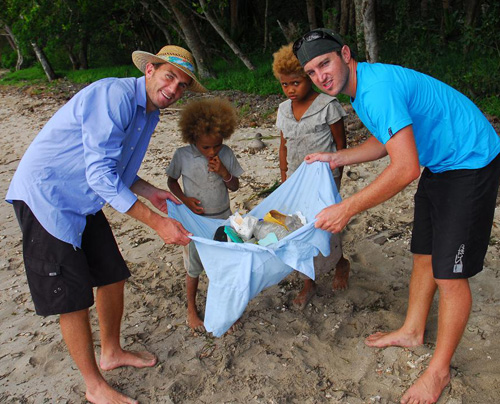
Bryson Robertson may be the only student in U of G history to do his PhD coursework from inside a 40-foot-long box. OK, he wasn’t actually living in a box. But that’s how he describes his accommodations for the past three years spent sailing around the world.
He took part in the OceanGybe expedition, a global research and outreach project, with his older brother, Ryan, and long-time friend Hugh Patterson.
Part research and part personal quest, their voyage aimed to raise awareness of the deterioration of the Earth’s oceans and document the extent and effects of marine pollution. They sailed through every major ocean on Earth and visited pristine coastlines, remote islands and the most contaminated beaches in the world.
Sailing westward from Mexico in 2007, they sailed 75,000 kilometres past almost three dozen countries, including New Zealand, Indonesia, South Africa, Brazil and the United States. They landed in Vancouver in September.
Along the way, they collected, measured and logged plastic trash of all sorts, shapes and sizes from every place imaginable. Robertson did both his coursework and research for his doctorate in civil engineering on the boat.
“The biggest garbage dumps in the world are our oceans,” he says. “We’ve been dumping everything into our oceans for decades — plastics, chemicals, you name it — and so few people think about the effects of plastic garbage on our oceans: where that garbage ends up, how it affects the local population at the destination, and how a lack of action on one side of the world has an incredibly destructive result on the other side of the world.”
Robertson is out to change this lack of awareness, starting with those he thinks are most likely to make a difference: children. The voyage took him to school classrooms all over the globe.
“Creating change in the next generation is our big push,” he says. “Children are moved by demonstrative examples, like when you tell them hermit crabs are wearing film canisters instead of shells on their backs because there is more plastic on the beaches than shells. Children are provoked to change and go home and give their parents a hard time about their habits.”
Robertson logged his findings on the OceanGybe website and on Facebook, Twitter and Google Earth. He and his mates also created “webisodes” that they are now weaving into a documentary, Our Plastic Oceans, to be finished next spring.
“We want people to start to understand the impacts their personal decisions are having on the world,” he says.
They devised a scale to measure pollution based on the amount of debris washed up on a 100-metre stretch of beach. One of the worst beaches was on Australia’s isolated Cocos (Keeling) islands. “There was so much garbage we couldn’t do our usual 100 metres; there was too much to pick up,” he says. “In 10 metres on one beach, we collected 339 bottles and 246 sandals.”
He says the method they employed was far from your standard rigorous science. “But that’s not the purpose; the value of our work is more in terms of educational content and demonstrative examples than graphs and statistical tolerances. There is a huge environmental message here.”
Born in Zimbabwe and raised in South Africa, Robertson studied engineering at the University of Victoria after his family moved to Canada 10 years ago. He began graduate studies with Kevin Hall when the professor was head of civil engineering and the Centre for Water and the Environment at Queen’s University. When Hall came to U of G as vice-president (research), Robertson came with him ─ albeit virtually, as he was only midway through OceanGybe’s journey.
Now back on dry land, Robertson is continuing his PhD studies on how ocean-floor topography affects surface waves. He is also taking his OceanGybe message to schools across Canada.
Although he hopes to help change the world, Robertson admits the journey started out as a “purely hedonistic” adventure. All three crewmates had recently finished university and, as he says, “we wanted to surf, sail around the world and have fun before entering the rat race. But then I started thinking: ‘If I am going to take three years out of my life to do something, it should have some meaning.’”